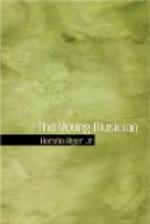After the train was a mile or two on its way he felt in his pocket for the wallet, meaning to regale himself with a sight of its contents—now, as he considered, all his own.
Thrusting his hand into his pocket, it met—vacancy.
Pale with excitement, he continued his search, extending it to all his other pockets. But the treasure had disappeared!
Professor Riccabocca was panic-stricken. He could hardly suppress a groan.
A good woman sitting opposite, judging from his pallor that he was ill, leaned over and asked, in a tone of sympathy:
“Are you took sick?”
“No, ma’am,” answered the professor sharply.
“You look as if you was goin’ to have a fit,” continued the sympathizing woman. “Jest take some chamomile tea the first chance you get. It’s the sovereignest thing I know of—”
“Will chamomile tea bring back a lost pocket-book?” demanded the professor sharply.
“Oh, Lor’! you don’t say you lost your money?”
“Yes, I do!” said Riccabocca, glaring at her.
“Oh, dear! do you think there’s pickpockets in the car?” asked the old lady nervously.
“Very likely,” answered the professor tragically.
The good woman kept her hand in her pocket all the rest of the way, eyeing all her fellow passengers sharply.
But the professor guessed the truth. He had lost his wallet when he stumbled in the field. He was in a fever of impatience to return and hunt for it. Instead of going on to Chambersburg, he got out at the next station—five miles from Knoxville—and walked back on the railroad-track. So it happened that the telegram did no good.
The professor walked back to the hotel across the fields, hunting diligently, but saw nothing of the lost wallet. He entered the hotel, footsore, weary, and despondent. The first person he saw was Philip, sitting tranquilly in the office.
“Did you just come down from your room?” asked our hero coolly.
“I am a most unfortunate man!” sighed Riccabocca, sinking into a seat.
“What’s the matter?”
“I’ve lost all our money.”
“I am glad you say ‘our money.’ I began to think you considered it all yours. Didn’t I see you on the train?”
“I had a bad headache,” stammered the professor, “and I didn’t know what I was doing.”
“Does riding in the cars benefit your head?”
Professor Riccabocca looked confused.
“The wallet was found,” said Philip, not wishing to keep him any longer in suspense.
“Where is it?” asked the professor eagerly.
“Mr. Perry will give it to you. I have taken out my share of the money, and Mr. Gates has received the amount of his bill. It would have been better for you to attend to these matters yourself like an honest man.”
Professor Riccabocca was so overjoyed to have back his own money that he made no fuss about Philip’s proceedings. Indeed, his own intended dishonesty was so apparent that it would have required even more assurance than he possessed to make a protest.




